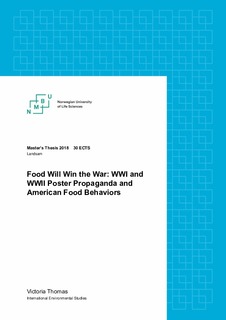Food will win the war : WWI and WWII poster propaganda and American food behaviors
Master thesis
Permanent lenke
http://hdl.handle.net/11250/2583549Utgivelsesdato
2018Metadata
Vis full innførselSamlinger
Sammendrag
This thesis provides a narrative history of the story told about food consumption, food waste, and food conservation through government sponsored posters during WWI and WWII. Throughout both world wars, the U.S. government pledged to provide food aid to war-torn Europe, requiring the U.S. government to manage agricultural resources, food production, distribution, and prices, and consumer food behaviors on an unprecedented scale. Thus, the U.S. government created poster campaigns in an attempt to alter American citizens’ food behaviors. War posters encouraged reducing food waste on the home front by persuading consumers to produce, purchase, prepare, preserve, and conserve food for the war effort. Serving as representations of the times in which they were created, 44 posters were examined using thematic analysis, interactive image analysis, and propaganda analysis. By analyzing 21 WWI posters and 23 WWII posters, I identified six specific food behaviors which were targeted by the U.S. government: reducing consumption, using alternatives, canning food, not throwing food away, rationing, and recycling waste fats. A variety of methods were used to persuade consumers to conserve food including directing messages towards target audiences, such as women or soldiers, inspiring patriotism or guilt, and normalizing food conservation efforts. However, differences in WWI and WWII poster propaganda revealed the importance of context in influencing food behaviors. For instance, WWI food posters focused heavily on persuading Americans to consume less meat, wheat, and sugar, which was not needed in WWII, because government-mandated food rationing limited the consumption of these foods instead. While the context in which food conservation posters were created is one of the past, the messages about food and consumption hold valuable lessons for inspiring consumers to reduce food waste today. Therefore, this thesis is descriptive, serving as a foundation for further exploration and debate around shaping consumer food behaviors and the role poster propaganda played in using food to connect citizens to their own behaviors, the war effort, and their nation.

